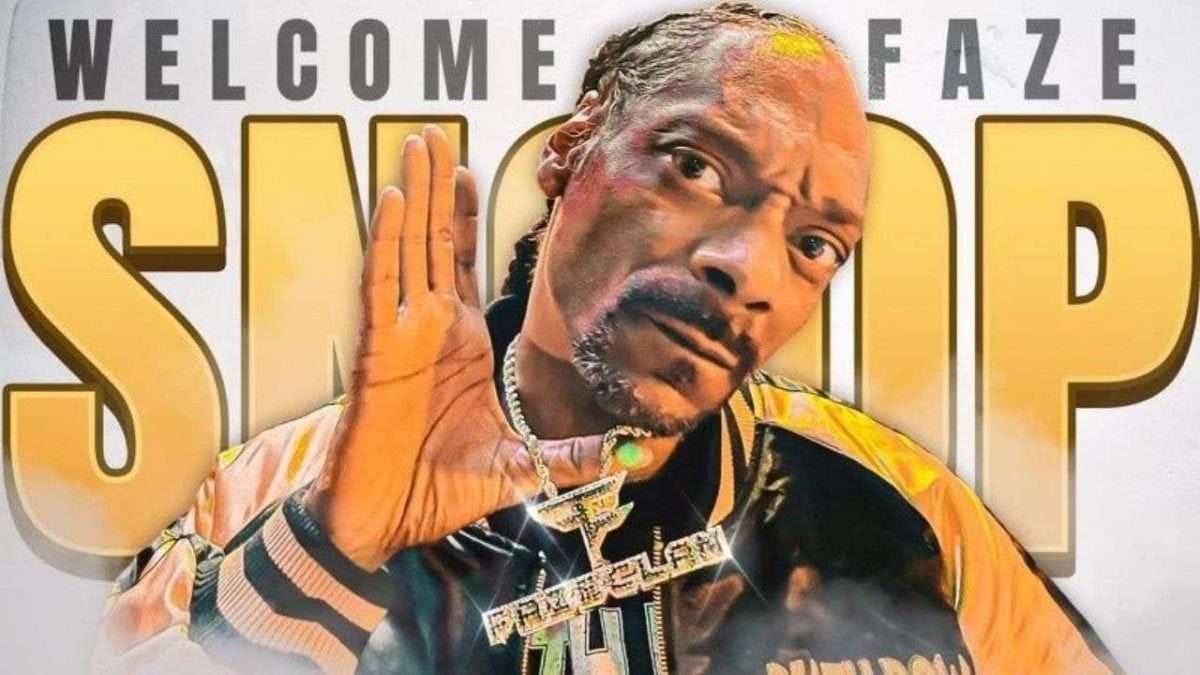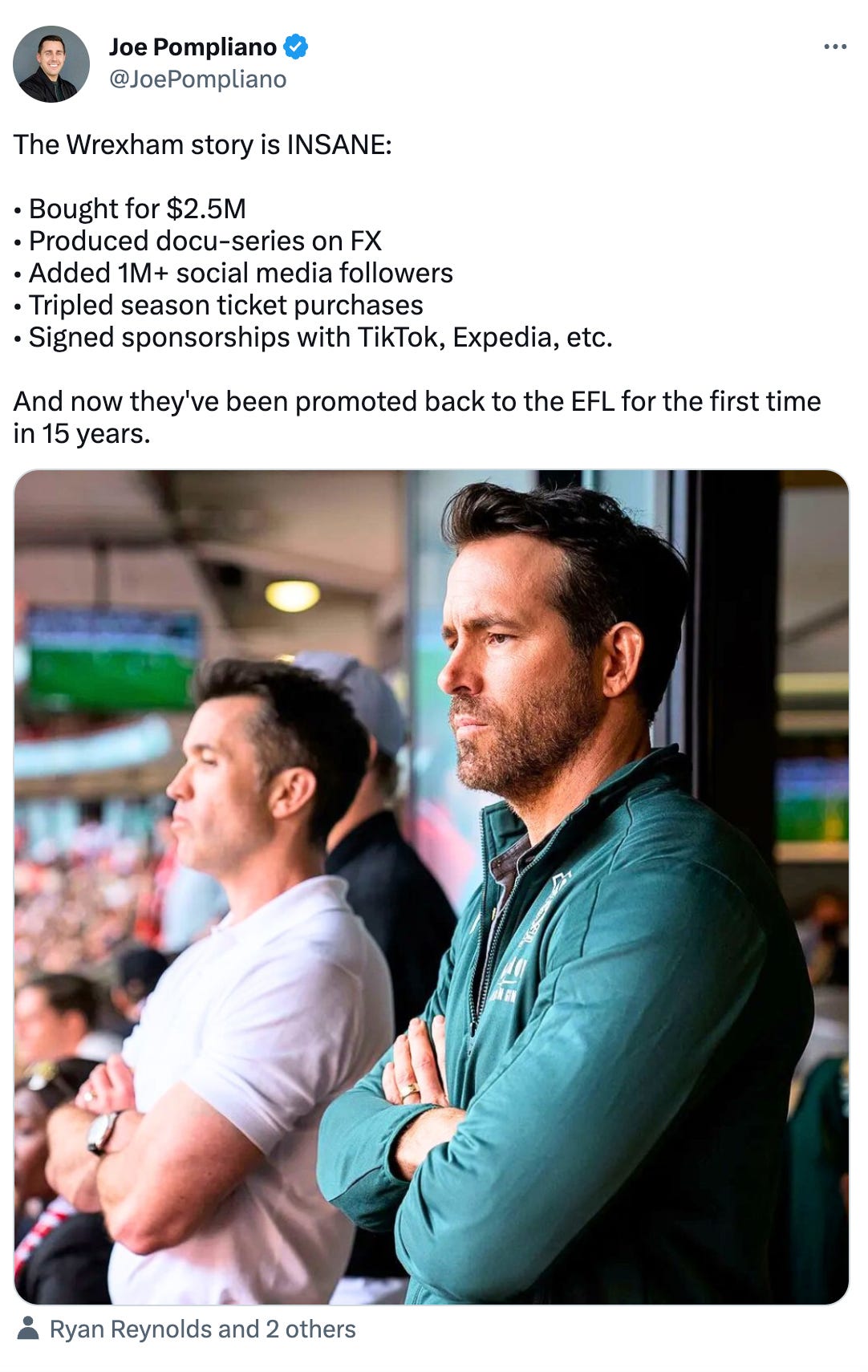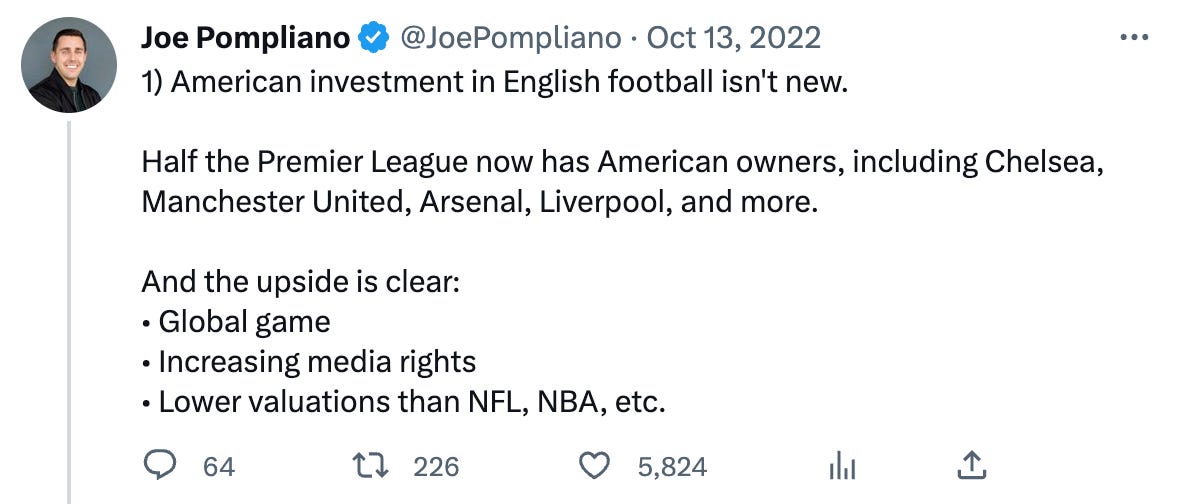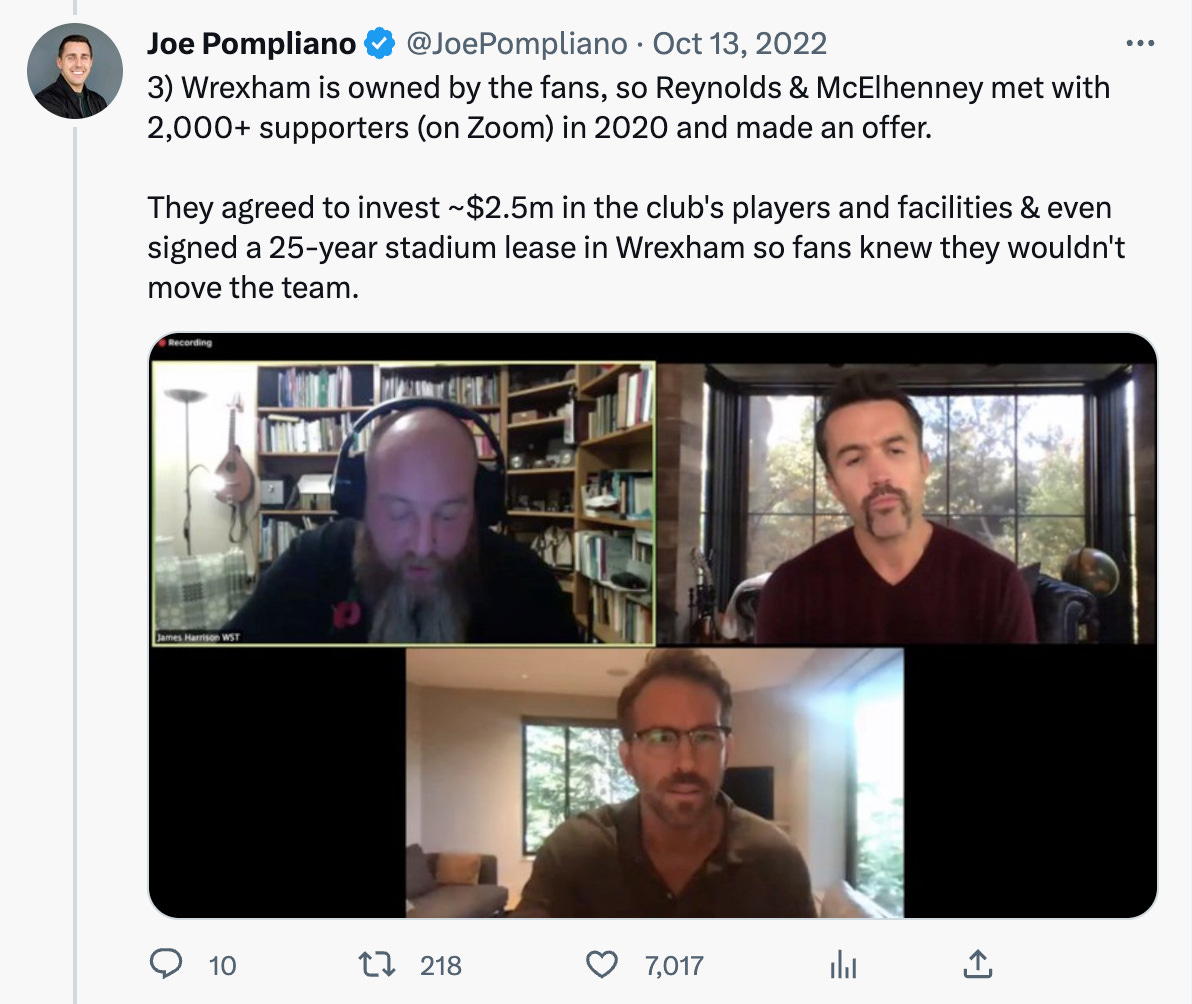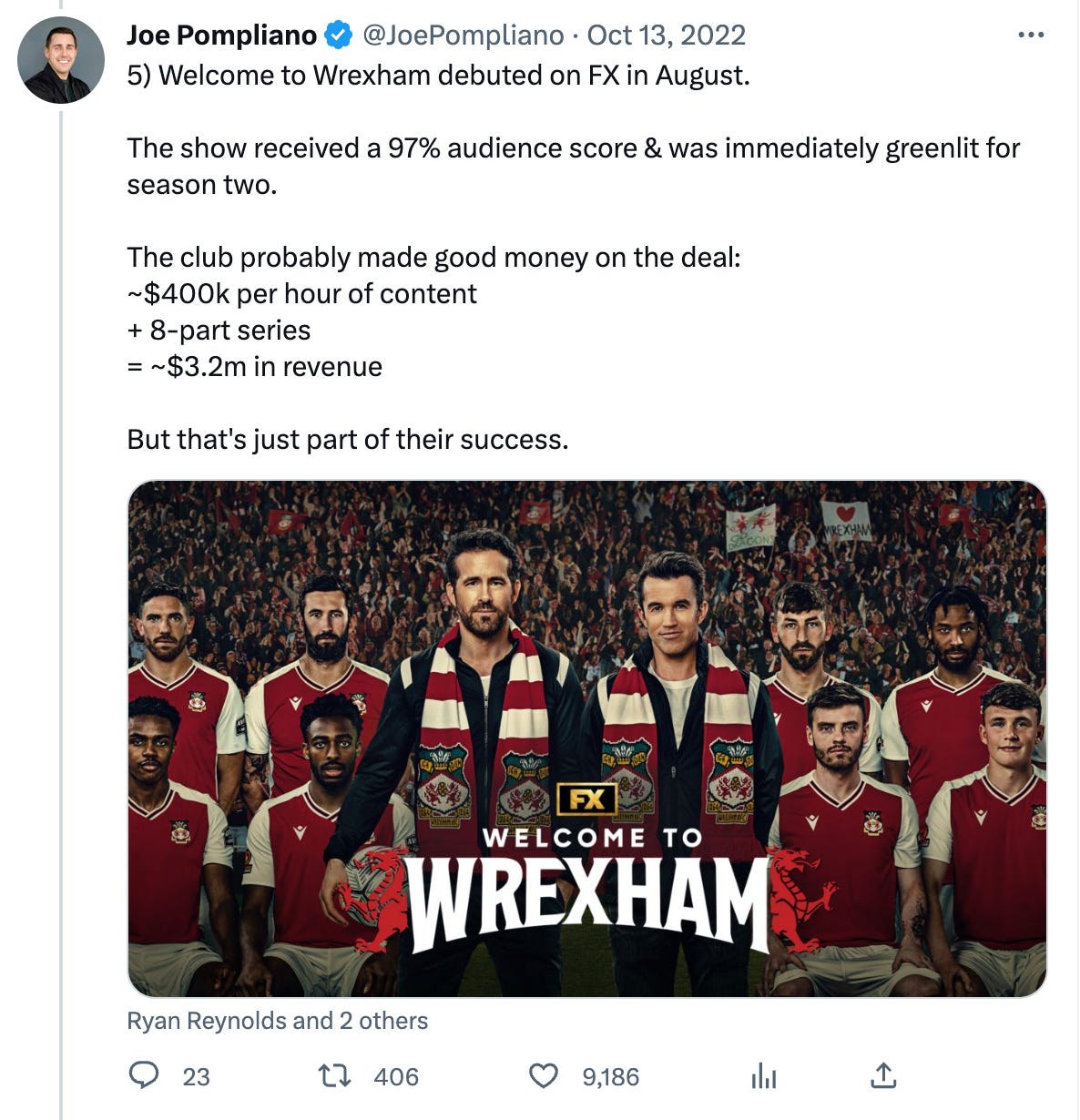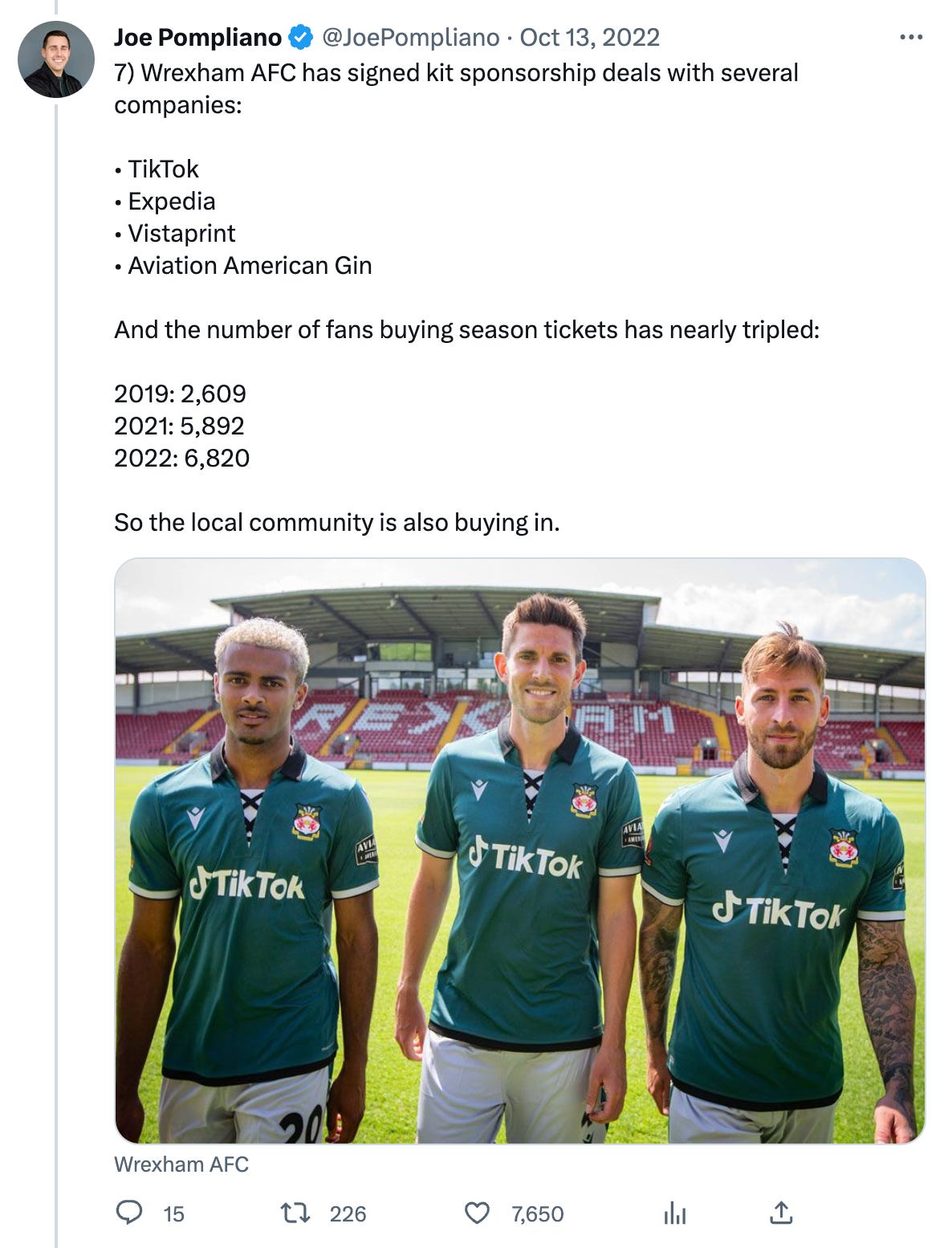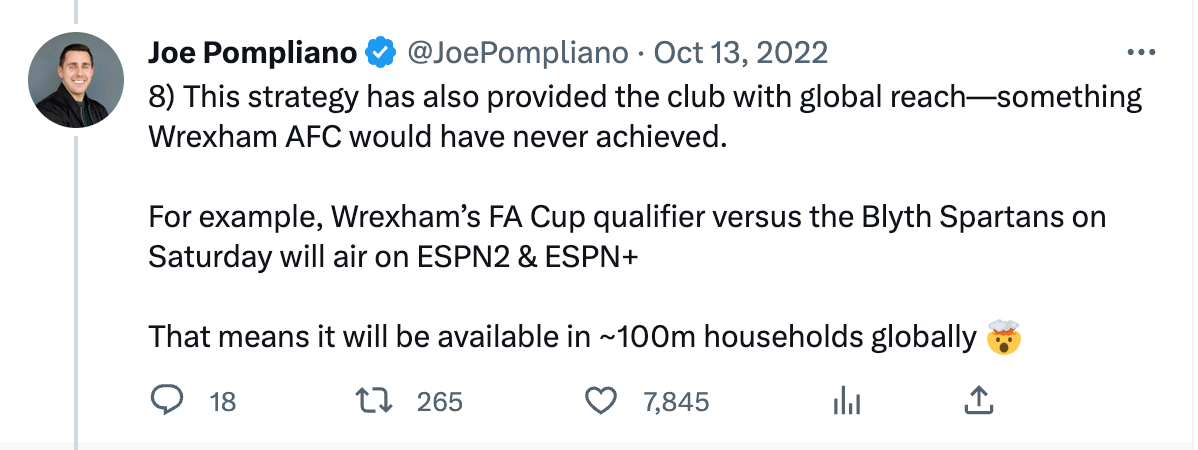🔬 Case Study: FaZe Clan vs. Wrexham AFC
A lesson in stakeholder management and converting communities into corporations
This week’s Roundtable Roundup takes a closer look at two of the most compelling community / business stories over the last several years — FaZe Clan FAZE 0.00%↑, arguably the world’s most recognizable esports brand that has struggled on the NASDAQ, and Wrexham AFC, the recently rejuvenated Welsh football club who’s redemption story is taking the world by storm.
SUMMARY: Less than one year after going public via $750M SPAC Merger, FaZe Clan is exploring a restructuring plan that would take the business private. FaZe Clan has been trading below the NASDAQ’s minimum trading requirement of $1 per share since February 2023 after peaking at over $17 per share in September 2022. On March 30th, FaZe Clan reported a $53.2M loss for 2022, and less than a week later, Snoop Dogg filed a letter with the SEC resigning from FaZe Clan’s board of directors after serving for just 13 months. For many people less familiar with esports, Snoop Dogg introduced FaZe Clan into mainstream popular culture when he wore a FaZe Clan pendent on stage at the 2022 Super Bowl in Los Angeles.
On April 15th, 2023, Ricky Bengston aka FaZe Banks, an early member and COO of FaZe Clan, tweeted the below message setting up an impasse between the cultural owners of FaZe Clan and FaZe Clan management / shareholders.
Banks insinuating that today’s stakeholders in FaZe Clan “have no idea what FaZe is” could be very true. For institutional investors, FaZe Clan has been sold as a “lifestyle and media platform rooted in gaming and youth culture” which is being judged on its fundamentals, longterm revenue prospects and quarterly results. For Banks, FaZe Clan is a way of life and an emotional connection with a community that is only strengthened with more authentic content from its leaders. We are seeing in real-time that it’s very difficult to reconcile these different perspectives.
🎮 Why gaming culturally matters
Gaming, and the culture that has formed around it, is the foundation of our contemporary digital world and it’s no secret that many successful digital entrepreneurs started their journeys in gaming. Steve Jobs and Steve Wozniak founded Apple after working together for the leading video game maker at the time, Atari. Alexis Ohanian, the founder of Reddit and VC firm Seven Seven Six, likes to remind people that “video games defined my childhood and thus my entire career” and few people know Elon Musk got his start as a 12 year old entrepreneur in the 1980s when he created a Space Invaders clone called Blastar and published the code in a local South African magazine.
Modern gaming culture, and by extension popular youth culture, developed in the late 2000s and early 2010s when gamers began using graphics cards to record montages of gameplay and uploading clips to YouTube. For early esports pioneers, winning matches wasn’t only criteria for success in titles such as Call of Duty but also how you played the game mattered for recognition and clout.
This culture originally manifested via OpTic Gaming, an esports team that formed around ‘quick scope’ sniper montages that demonstrated supreme Call of Duty mastery. OpTic’s showmanship and content strategy inspired an entire generation of gamers and content creators, including a group of kids who started referring to themselves as ‘FaZe Sniping’ and they quickly built a following with their trick shots and commentary. By 2012, emerging Hip-Hop Artist Logic was wearing FaZe Clan merch in music videos, the group began fielding competitive esports teams, and the FaZe YouTube channel surpassed 1m subscribers.
Members of the Stakeholder Labs team working at Google / YouTube at the time saw firsthand how lifestyle and commentary surrounding gaming was dominating our platforms and no group brought together power of parasocial interactions facilitated by YouTube and hypebeast culture like FaZe Clan.
📈 How popular is FaZe Clan?
When comparing FaZe Clan’s digital reach with the biggest names in traditional sports it’s easy to imagine a future in which FaZe Clan is one of the most valuable brands in the world, particularly when accounting for the average age of each team’s fans. Many of the franchises listed below have been around for a century or more and have established a global footprint through decades of localized TV rights and fandom that has formed around the team’s success on the field. FaZe Clan is unique in this context because their fandom has formed around lifestyle content and a sense of community which was not rooted in a purpose or tangible business metrics.
As we have learned in previous Roundtable Roundups, Gen Z has entered the stock market in record numbers so intuitively one would assume that younger investors would have rushed into their Robinhood accounts to support Faze Clan, but that has not been the case. Since announcing their intention to go public via SPAC in late 2021, FaZe Clan has largely focused their fans on Web3 initiatives to offer ‘token ownership’ rather than educating their community around the longterm benefits of shareholder ownership. Stakeholder Labs is helping brands like FaZe Clan take the same mechanics used by NFTs to provide unique access and recognition within a community, but instead qualifying those benefits with a .jpeg, companies can verify stock ownership to create greater alignment among community members. FaZe Clan’s challenges translating their avid digital community into a loyal retail shareholder base is a huge missed opportunity for the brand and those of us working on the convergence of community and capital.
📚 Wrexham AFC: a lesson in harnessing the power of community
On the other side of the pond, actors / entrepreneurs Ryan Reynolds and Rob McElhenney have taken a vastly different approach to building a community-oriented sports franchise when they purchased a financially and competitively failing Welsh football club, Wrexham AFC, which was formed in 1864 and has been traditionally owned by its fans. Reynolds and McElhenney pitched the 2000 person ownership group on their vision for the club and their proposal was approved by 92% of the members.
Business of Sports commentator Joe Pompliano put together a perfect summary on how Reynolds and McElhenney leveraged new media strategies and their audiences to turn a legacy football club with an authentic local fanbase into a rapidly growing global community.
Reynolds summarized their community focused approach ahead of the launch of Welcome to Wrexham, “We don't want to center ourselves so much so that it becomes the ‘Rob and Ryan Show.’ But at the same time, we want to give our viewers insight into the absolutely remarkable and insane tightrope walk it is to attempt something this crazy and unexpected.” Needless to say, Reynolds and McElhenney have found the right balance of investment, engagement and amplification of the Wrexham community in a way that serves all stakeholders, not just legacy supporters or new investors. This community first strategy has positioned Wrexham to be one of the most intriguing (and potentially lucrative) stories in sports over the next decade.
✍️ Key takeaways:
FaZe Clan’s huge digital audience has not translated into a loyal retail shareholder base, in part, because there have not been proactive efforts to integrate equity ownership and corporate priorities into the brand’s community. Stakeholder Labs is seeking to solve this challenge for companies.
Growing a healthy global community that’s also a sustainable business over time requires strong executive leadership with a vision that is in direct service to the community.
Digital audiences value authenticity and legacy brands such as Wrexham are well positioned to leverage their unique histories and stories of perseverance to create globally influential communities.
Communities sustain growth when they are oriented towards collective action and shared values, and while hype-orientated lifestyle content performs well on the internet, we will learn over time if that is enough of a foundation to propel FaZe Clan’s community into a successful corporation.



